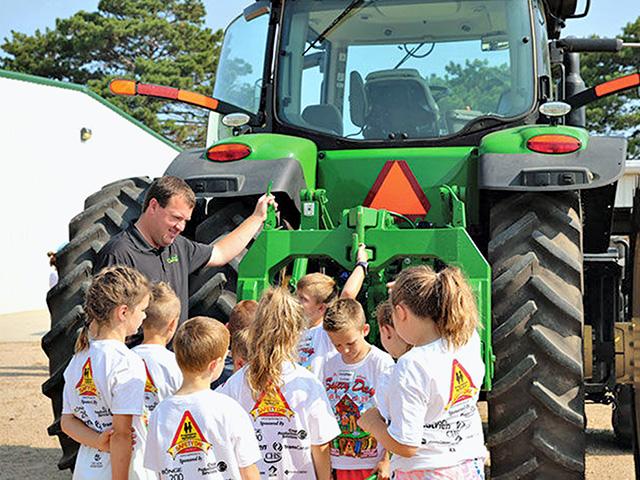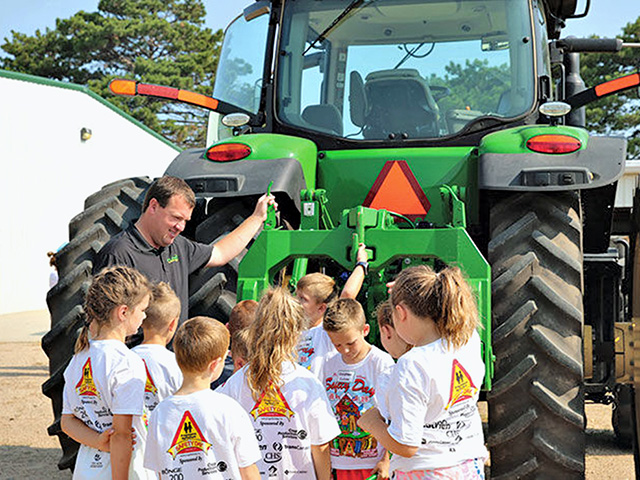MachineryLink
Online Training Keeps Young Ag Workers Safe
I think anyone who has spent any amount of time growing up on a farm or working on a farm has had close calls with some aspect of farm safety. It could be an incident with operating a tractor and implement or maybe something involving less than agreeable livestock.
As I have learned, sometimes it is a close call and sometimes it is a full-fledged accident. I have had my share of both, but about 20 years ago, I broke both of my wrists after a ladder I was on slid off a building. That was the worst accident I've had.
As you can probably imagine, breaking two of the same body parts is not much fun. I highly recommend not doing this.
New online training aimed at supervisors of young agricultural workers is now available in both English and Spanish. The goal of the training (https://hwc.public-health.uiowa.edu/…) is to protect younger workers, according to a press release.
The training was designed with input from agricultural educators, farmers, producers, supervisors, parents and agricultural safety and health professionals. The new project was supported by the National Institute for Occupational Safety and Health (NIOSH) through the National Children's Center for Rural and Agricultural Health and Safety and the Marshfield Clinic Research Institute located in Marshfield, Wisconsin.
Diana Rohlman and Shelly Campo were co-principal investigators on the Training for Supervisors of Young Agricultural Workers project. The pair are also University of Iowa Professors.
P[L1] D[0x0] M[300x250] OOP[F] ADUNIT[] T[]
Rohlman and Campo focused on supervisors because they assign tasks in the workplace and are responsible for training and safety.
"Youth working in agriculture are injured more often both fatally and non-fatally than youth working in other industries," Rohlman said. "We want to protect younger workers."
While the training is designed for employers, it is also relevant to parents who have children working on a family farm as well as high school agricultural teachers, 4-H leaders and FFA advisers. The training is available online at no charge and takes about 45 minutes to complete.
Younger workers are at risk for accidents due to the fact their brains and bodies continue to develop up to age 25, according to research. Furthermore, younger workers may lack experience and be afraid to speak up, and they may engage in risky behaviors or have poor decision-making skills.
It is up to supervisors to ensure these younger ag workers are trained to minimize risk and injury and protect themselves.
"In order to change behavior, supervisors need to know what the risks are and believe that young workers are more likely to get injured," she said. "If supervisors don't think there is a risk, they won't change their behavior."
One concept in the training is the teach-back method, in which a supervisor explains a task, shows how to do it and then has the worker describe it back and demonstrate how to do it. The training also teaches the supervisor how to ask open-ended questions rather than yes and no questions.
The training also discusses the role of policies in the workplace. These policies need to be enforced and followed by everyone, noting supervisors need to model safe behavior for employees, such as wearing a seat belt or not using a cellphone.
"We took what's called a Total Worker Health approach," Rohlman said.
To read the entire news release click: https://marshfieldresearch.org/…
Farm safety has long been a commitment for DTN/Progressive Farmer. The Progressive Agriculture Safety Day program, which is now part of a stand-alone foundation, is in its 26th year of providing age-appropriate, hands-on events for children 4 to 13 on topics affecting safety and rural communities. Learn where events are being held at www.progressiveag.org. This year, many sessions are being held virtually.
Russ Quinn can be reached at russ.quinn@dtn.com
© (c) Copyright 2020 DTN, LLC. All rights reserved.





Comments
To comment, please Log In or Join our Community .